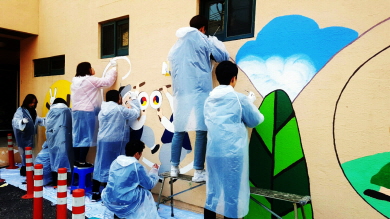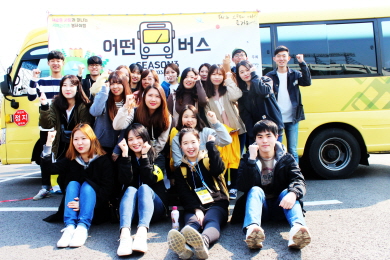
One fine Saturday morning at the end of March, a crowd of people of 400 hovered over 20 buses, with each of them holding a piece of paper in their hands. The papers given by the organizer contained hints about where each bus will take them, and people stood contemplating which bus to choose.
This number of people gathered early on Saturday morning to get on the “Good-will Bus.” The 400 people gathered were actually volunteers who would be taken to 20 different volunteer centers by the buses. Although the activity might seem ordinary, what makes this project special is that people would not be certain of where they were going until they were notified by the staff members.
The “Good-will Bus” was first established by the students of “Go Geeks” from KAIST. “Go Geeks” was originally a group which plans and carries out cultural projects. However, the students thought that there was a limit to fulfilling all the projects that they have planned, so they decided to concentrate on a single project and do their best to turn it into a successful one. They recruited more staff members through friends, and the project that they came up with was the “Good-will Bus” that now exists today.

The “Good-will Bus” was a project which bench-marked “Do-good Bus” from the United States. It is a good opportunity for volunteers to alleviate their dilemma of choosing which volunteering to do and as well as meeting new people.
“The slogan of our project is ‘Volunteering is not for writing one more sentence at a resume, but a pleasure,” said Shin Ji-won, the
“Good-will Bus” director of the operation team of season 3. “Nowadays, due to the requirement of qualification for employment, it is difficult to find volunteers with intents to actually ‘help’ people in need. To recover the essential purpose of volunteering and to help people realize that volunteering can be enjoyable, I have participated as a staff member in the ‘Good-will Bus’ since its first season.”
The staff members have met every Sunday for three months before the beginning of this season. The staff teams are divided into three categories: operation, contents, and marketing. The contents team contacts the volunteer centers suitable for the event, the operation team takes care of the general management of the project such as checking the progress of other teams, deciding the meeting place for 400 people to gather and receiving sponsors. The marketing team promotes the project so that more people would hear of it and participate.
“Although it is a project that happens only twice a year, having 400 people participate is a big event to organize, which is why meticulous preperation is essential,” Shin said. “However, we are sometimes faced with proglems we cannot fix. For instance, in the latest season when we planned on outdoor activities with children, we were notified by the center that the child will be eight-year-old. So we prepared Pororo, a popular Korean animation character, sing-alongs and other activities that we thought were suitable for eight-year-old. When we arrived at the center, however, the children turned out to be 13. We hastily changed the program but we heard a lot of complaints that it was boring.”
While working as a staff member for the “Good-will Bus” and the director for the latest season, Shin recalls that the project has gone through some tough times, especially in the first season. The biggest worries for the first season was the financial burden. Since they had no sponsors in the first season, the cost for renting the buses, gathering place and after parties were covered from the leader’s private expense.
Despite the difficulties of the first season, the staff members decided to expand the number of participants and buses from 150 to 400 people and from five to 20 buses respectively, because they thought there needed to be an improvement or an eye-catching difference from the previous one. Even though, enlargement of the project meant more work for hte members, they have agreed to expand the domain.
“I guess the members have agreed to do so because there are precious moments that provide motivation to continue the project,” Shin said. “For me, it is when the participants who have first started volunteering through the ‘Good-will Bus’ e-mail to thank us for the project, and ask for the contact number of the center so that they can continue to volunteer regularly. All members feel especially proud when the participants exclaim how wonderful the program was. Such experiences drive the members to have a fresh start every time they prepare for another season.”

